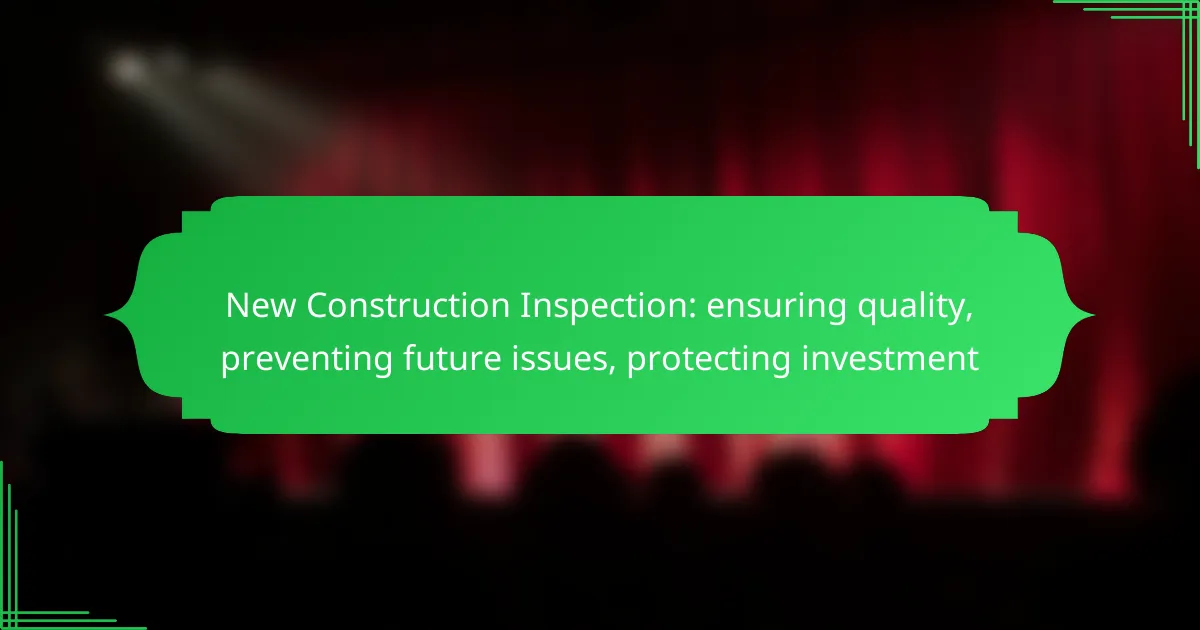New construction inspections are vital for ensuring quality and preventing future issues in your building project. By identifying potential problems early, these inspections help maintain high standards and protect your investment, ultimately enhancing the safety and integrity of the structure for future occupants.

How can new construction inspections ensure quality in Los Angeles?
New construction inspections in Los Angeles are essential for maintaining high standards and preventing future issues. These inspections help identify potential problems early, ensuring that the construction meets quality expectations and protects your investment.
Thorough visual assessments
Thorough visual assessments involve a detailed examination of the construction site, including structural elements, finishes, and systems. Inspectors look for visible defects, such as cracks, misalignments, or improper installations, which could lead to larger issues down the line.
During these assessments, inspectors often utilize checklists to ensure that all critical components are evaluated. This systematic approach helps in identifying any discrepancies from the planned specifications.
Use of advanced technology
Advanced technology enhances the effectiveness of new construction inspections. Tools such as thermal imaging cameras, moisture meters, and drones provide inspectors with insights that are not visible to the naked eye.
For instance, thermal imaging can detect heat loss or moisture intrusion, which may indicate underlying problems. Utilizing these technologies can lead to more accurate assessments and ultimately save time and money by addressing issues early.
Compliance with local building codes
Compliance with local building codes is a critical aspect of new construction inspections in Los Angeles. These codes set minimum safety and quality standards that all construction projects must meet.
Inspectors verify that the construction adheres to these regulations, which can include structural integrity, fire safety, and energy efficiency. Ensuring compliance not only protects residents but also helps avoid costly fines and rework.
Engagement of certified inspectors
Engaging certified inspectors is vital for ensuring quality in new construction. Certified professionals possess the necessary training and experience to identify issues that may not be apparent to untrained eyes.
In Los Angeles, hiring inspectors with specific certifications related to local building practices can provide additional assurance that the inspection will be thorough and compliant with local standards.
Detailed documentation of findings
Detailed documentation of findings is crucial for tracking the inspection process and addressing any identified issues. Inspectors typically provide comprehensive reports that outline their observations, including photographs and recommendations for remediation.
This documentation serves as a valuable resource for homeowners and builders alike, facilitating informed decision-making and ensuring that any necessary corrections are made before project completion.

What are the benefits of new construction inspections?
New construction inspections provide critical advantages by identifying potential issues early, ensuring quality workmanship, and safeguarding your investment. These inspections help maintain the integrity of the structure and enhance overall safety for future occupants.
Prevention of future structural issues
Conducting a new construction inspection can uncover hidden defects that may lead to significant structural problems down the line. Common issues include improper foundation work, inadequate framing, or faulty electrical systems. Addressing these concerns early can save homeowners from costly repairs later.
Inspectors typically evaluate various elements, such as roofing, plumbing, and HVAC systems, to ensure they meet local building codes and standards. Regular inspections during different construction phases can help catch problems before they escalate.
Protection of investment value
A thorough inspection helps protect the value of your investment by ensuring that the construction meets quality standards. If issues are identified and resolved promptly, the property retains its market value and can appreciate over time. This is particularly important in competitive real estate markets.
Investors should consider inspections as part of their overall strategy. A well-maintained property is more likely to attract buyers or tenants, leading to better financial returns. Additionally, having a clean inspection report can facilitate smoother transactions when selling the property.
Enhanced safety for occupants
Safety is a primary concern in any new construction. Inspections help ensure that the building complies with safety regulations, reducing risks of accidents or injuries. For example, checking for proper installation of smoke detectors and fire exits is crucial for occupant safety.
Moreover, identifying potential hazards, such as mold or structural weaknesses, contributes to a healthier living environment. Homeowners can enjoy peace of mind knowing that their new home is safe for themselves and their families.
Increased buyer confidence
Having a professional inspection report can significantly boost buyer confidence. Prospective buyers are more likely to invest in a property that has been inspected and certified as safe and sound. This transparency can lead to quicker sales and potentially higher offers.
Real estate agents often recommend that sellers obtain inspections before listing their properties. This proactive approach not only highlights the property’s strengths but also addresses any weaknesses, making it more attractive to buyers.

What are common issues found during inspections?
Common issues found during new construction inspections include improper electrical installations, inadequate plumbing systems, structural deficiencies, and insulation and ventilation problems. Identifying these problems early can prevent costly repairs and protect your investment.
Improper electrical installations
Improper electrical installations can lead to safety hazards and code violations. Common issues include overloaded circuits, incorrect wiring, and inadequate grounding. Ensure that all electrical work complies with local codes and is performed by licensed electricians.
During inspections, check for signs of poor workmanship, such as exposed wires or mismatched outlets. It’s advisable to have a qualified inspector review the electrical systems to ensure safety and functionality.
Inadequate plumbing systems
Inadequate plumbing systems can result in leaks, low water pressure, and drainage issues. Common problems include improperly sized pipes, faulty fixtures, and insufficient venting. These issues can lead to water damage and increased utility costs.
Inspect for signs of leaks, such as water stains or dampness around fixtures. A thorough plumbing inspection should include checking the water supply and drainage systems for proper installation and functionality.
Structural deficiencies
Structural deficiencies can compromise the integrity of a building, leading to safety risks and costly repairs. Issues may include poor foundation work, inadequate framing, and improper load-bearing designs. It’s crucial to address these problems early to avoid significant structural failures.
During an inspection, look for cracks in walls, uneven floors, and doors that do not close properly. Engaging a structural engineer can provide a detailed assessment of any potential issues.
Insulation and ventilation problems
Insulation and ventilation problems can lead to energy inefficiency and poor indoor air quality. Insufficient insulation can cause heat loss in winter and excessive heat in summer, while poor ventilation can trap moisture and pollutants. Ensuring proper insulation and ventilation is essential for comfort and energy savings.
Check for gaps in insulation, especially in attics and crawl spaces. Ensure that ventilation systems are properly installed and functioning to promote airflow and reduce humidity levels. Regular inspections can help maintain a healthy living environment and lower energy bills.

How to choose a qualified inspector in California?
To choose a qualified inspector in California, prioritize their certifications, experience, and client feedback. A thorough vetting process ensures that the inspector can effectively assess new construction quality and help prevent future issues.
Check certifications and licenses
Start by verifying that the inspector holds relevant certifications and licenses required in California. Inspectors should be certified by organizations such as the International Association of Certified Home Inspectors (InterNACHI) or the American Society of Home Inspectors (ASHI).
Additionally, ensure they have a valid California contractor’s license if applicable. This not only confirms their expertise but also their adherence to state regulations.
Review client testimonials
Client testimonials provide insight into the inspector’s reliability and thoroughness. Look for reviews on platforms like Yelp, Google, or specialized home inspection websites.
Pay attention to feedback regarding their communication skills, thoroughness of the inspection, and how well they addressed client concerns. A pattern of positive reviews can indicate a trustworthy inspector.
Compare inspection services offered
Inspectors may offer varying levels of service, so it’s essential to compare what each provides. Some may include specialized services such as thermal imaging or mold assessments, while others may focus solely on standard inspections.
Request a detailed list of services and ensure they align with your needs. Understanding what is included in the inspection can help you make a more informed decision.
Evaluate experience with new constructions
Experience with new constructions is crucial for identifying potential issues that may arise during the building process. Inspectors who specialize in new builds will be familiar with common construction practices and potential pitfalls.
Ask about their specific experience with new construction inspections and request examples of past projects. This will help you gauge their expertise and ability to protect your investment effectively.

What are the costs associated with new construction inspections?
The costs associated with new construction inspections can vary widely based on several factors, including location, property size, and the complexity of the project. Typically, homeowners can expect to pay anywhere from a few hundred to several thousand dollars for a thorough inspection.
Average inspection fees in California
In California, average inspection fees generally range from $300 to $800 for standard residential properties. Larger or more complex projects, such as commercial buildings, can incur fees upwards of $1,500. It’s advisable to obtain quotes from multiple inspectors to ensure competitive pricing.
Factors affecting inspection costs
Several factors can influence the cost of new construction inspections. The size and type of the property play a significant role; larger homes or specialized structures may require more time and expertise, leading to higher fees. Additionally, the inspector’s experience and reputation can also affect pricing.
Other considerations include the geographic location and the specific services requested. For instance, inspections that include specialized assessments, such as for environmental hazards or energy efficiency, may incur additional costs. Always clarify what is included in the inspection fee to avoid unexpected charges.
